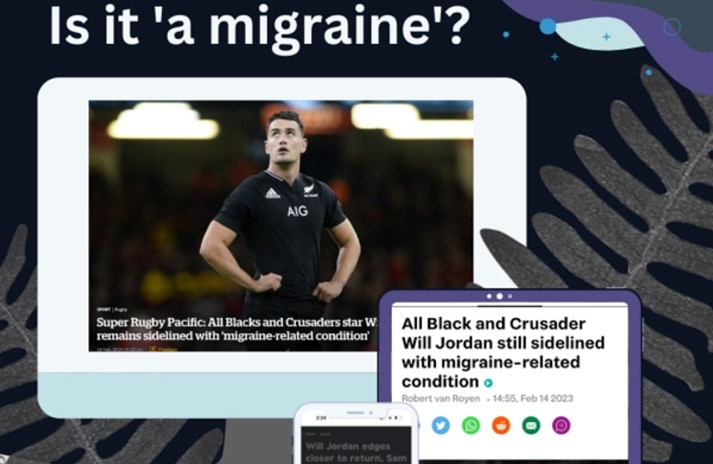What a week! No sooner did the wrath of Cyclone Gabrielle move away from Aotearoa leaving devastation in its wake, than Kiwis were hit with the news that All Blacks and Crusader Will Jordan will miss the start of the Super Rugby season due to “diagnosis of a migraine-related condition.”
Coach, Scott Robertson explained further: “It is a migraine, it’s not concussion based.” (NZ Herald, Stuff)
“It is a migraine.”
It’s a common phrase, but for us, it clangs, discordant with the keen empathy we feel for a rugby hero at the top of his game, hindered by migraine.
As the refrain goes, migraine is not just a headache. Yet we know it’s often confused with headaches. A key reason why is to do with how we talk about migraine.
It may clang for us, but Scott Robertson is not to blame. He spoke about migraine in a traditional way. Traditionally we say people ‘have migraines’, just like we say people ‘have headaches’. We’ve been talking about migraine as if it’s an annoyance that goes away, just like a headache.
But when we talk like this, it minimises and trivialises migraine disease. Unlike headache, which is a common symptom of migraine, migraine is a chronic and often disabling neurological disorder that never goes away.
People with migraine have migraine disease all the time, even when they feel okay. Outside of a flare-up, people with migraine do a plethora of things to manage triggers and avoid becoming unwell.
To name a few, these include:
- taking preventives (and dealing with side-effects)
- sticking to a routine (sleep, exercise, meditation, regular food intake, staying hydrated)
- dodging triggering environmental factors (certain lighting, sound, fragrance)
- paying attention to our bodies for early signs of an acute attack (ear-ringing, flatulence, visual auras, struggling to concentrate, aphasia)
- carrying a kit of medication and other remedies to stave off a suspected attack as soon as possible
- keeping a diary to record symptoms, possible triggers and remedies tried.
Language that trivialises migraine as something temporary, like a bad headache, feeds the stigma that surrounds it – the stigma that is responsible for migraine’s history of being dismissed by funders, researchers, health practitioners and employers. It’s not uncommon for people with migraine to be misdiagnosed, not taken seriously, or accused of faking being sick when they mention their ‘migraines’. This is despite migraine being the sixth most disabling condition globally.
Luckily, language is constantly evolving. You might have noticed a change in how the migraine community talks about migraine:
- We don’t get ‘migraines’, we have ‘migraine disease’
- We don’t get ‘a migraine’, we are experiencing ‘a migraine attack’
- We didn’t ‘used to get migraines’, we are ‘in migraine remission’
The Coalition for Headache and Migraine Patients (CHAMP) has articulated how we can talk about migraine accurately and more empathetically in its language and image guide, which was developed in collaboration with patient advocates.
These changes in how we talk about migraine brings migraine language into line with other conditions. People with epilepsy experience seizures. People with asthma experience asthma attacks. People with migraine experience migraine attacks.
Which brings us back to Will Jordan. If Will Jordan had epilepsy, the coach wouldn’t have said, “It is an epilepsy.”
We don’t need the ‘a’ in front of the word ‘migraine’, nor an ‘s’ at the end of it.
And over on 1 News, there was not a single unnecessary ‘a’ or ‘s’. Just a reference to the quoted ‘migraine-related condition’, and a mention that he missed last year’s northern All Blacks tour due to ‘migraine symptoms’.
Well done, 1 News for helping break the stigma through appropriate use of migraine language, and well wishes to Will Jordan for effective treatment and a swift return to rugby.
Change doesn’t happen overnight, and habits are hard to break. We invite everyone to think about the language they use when talking about migraine to promote better understanding of the nature and impact of this disease.
Let’s not minimise it. ‘Migraine attack’ is an appropriately strong term for an intense event that derails plans – even the All Blacks’. It is so much more than a headache.


